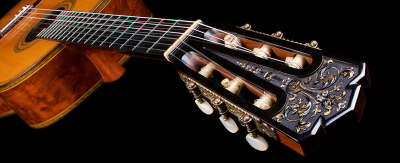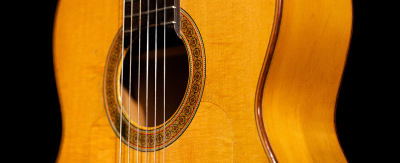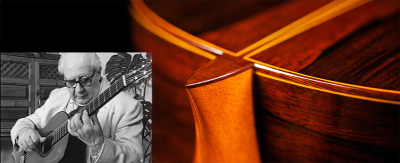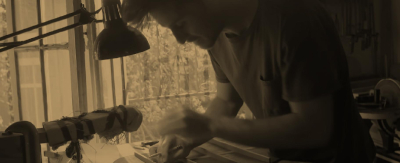An Interview with Klaus Reischl - "The Classical Guitar: A Complete History"
by John Morrish
Munich – “Oktoberfest World Headquarters” as I like to think of it – is full of great characters and none is more representative, or more fun to visit, than Klaus Reischl. With his son Peppe (Josef – Seppe in most other parts of the country) he keeps a small machine shop within an easy stroll of the Theresienwiese, which is where the Oktoberfest is held. I just happen to have noticed on the map, that’s all. In this little shop, tucked away off a side street, are made some very fine classic guitar tuners.
A few days ago, during the “Frulingsfest” (I think there was a notice in the newspaper) I stopped by their shop and paid a visit to Klaus and Peppe. I just meant to say “howdy” and pick up a catalog, but the visit ended up being the better part of a whole day and was so full of delightful stories and information that I want to get it down while it’s still fresh in my mind. Also, my German being what it is, much of the exact dialogue has been reconstructed with the inevitable loss of some of Mr. Reischl’s famous humor. But hey – I’m still learning!
Two blocks north of the Implerstrasse U-bahn station, left on Senserstrasse, two doors past the billboard of Carl Lewis in high heels (don’t ask) and in through the double door at #7. The only hint that I am in the right place is a small printed sign saying “Reischl” beside the door. Cross a little courtyard and you are in the shop.
Aside from the characters who inhabit the place, there is nothing here which is not familiar to a journeyman machinist who learned his trade in Missouri in the late ’60’s. Mills, drills, lathes, workbenches, and a rather unique assortment of ordinary-looking tools. On a makeshift worktable are ranks of finished tuners in silver and gold plate, which Peppe says are destined for the workshop of Hermann Hauser and for customers in Japan.
When they are not making tuners, the Reischls busy themselves fabricating metal boxes in various shapes and sizes for electronic instruments, which will see service in hospital operating rooms. These occupy shelves along the back wall.
My friend, Eddie Blochinger, introduced us some months ago and helped translate, but this time I was on my own. However, we had little trouble with language as Peppe proved very capable of converting my college German into Klaus’ Bavarian (don’t even get to thinking that everybody here speaks the same language) even though we did resort to pictographs for such technical terms as “moose,” “sheep, “aircraft carrier,” and “paraglider.”
Klaus, how and when did you get started with Landstorfer?
In 1952 I started doing engraving for him, and as time went on he taught me all the processes for making the machine heads.
And how long did you work with Landstorfer?
Until he died, in 1976. I bought the business from his widow and moved the shop here, to Senserstrasse.
When I visited Eddie, you showed us some beautifully engraved cover plates for zither and contra-guitar machines, as well as bass viol side plates. Do you make anything besides the classic guitar tuners – like perhaps for mandolin?
No, mainly just guitar machines, and you saw the ones for Bolin, with eleven strings.
Do you make all the parts for the tuners, or do you send out for any of them?
We machine all the metal parts from bar and plate stock. You see on these, how these parts were stamped? [Shows me an old set of Landstorfer – the finish doesn’t look as good as on the new ones, either]. We also do the gold and silver plating. Only the mother-of-pearl and plastic buttons are bought. We also make buttons and rollers from black horn. The pearl is very pretty, but it is brittle. [At this point Klaus takes a piece of buffalo horn over to his workbench and gives it a fell blow with his heavy machinists hammer.] You see? No effect.
Wow. Can’t do that with the pearl, huh?
No, not quite. We guarantee all our goods for life, but no the pearl keys. If a careless guitarist lets the instrument fall on its back, they’re so fragile… And these things, what do you call them? [Klaus makes the international sign of the power string-winder.] Don’t use them! Use the fingers, it doesn’t take that much longer.
You give a lifetime guarantee on the stuff you make, but what if a customer has on old set of Landstofers?
The new machines have an improved system, since ’91, so we will upgrade the old tuners for the cost of the new parts. We leave the rollers, plates, and buttons – just replace what is necessary.
You talked about the system. What is the difference between your tuners and, say, David Rodgers?
Well, Rodger’s cost a lot more [laughs all around]. Rodgers makes an absolutely beautiful tuner, no question about it. Ours are just made to a different principle. See, Rodgers’ are very smooth turning, because he uses Teflon.
Seems like all the players and builders I’ve talked to around here prefer your tuners. The consensus is that they think they have a more positive feel that you don’t have to depend solely on the ear.
Well, our gears use a natural lubricant! Steel against brass. And the design of the teeth. And very close tolerances.
My day job for a number of years was very much this type of work – machinist, tool maker, etc. – and I have to wonder. I know how difficult it is to make a fixed gear set run as smooth as these do, as small as they are. And I just noticed that the brass gears are broached on their i.d., to accept the string post mandrels. Now, how do you locate these, with the equipment you have here, in order to have them perfectly concentric with the axis of the roller?
[No answer – they just smiled at me for a minute and then offered me a beer.]
[During my visit, we talked about zithers and the scarcity of good American players while there are hundreds of fine old German zithers in junk shops and used music stores. Klaus produced a cassette tape of himself playing some beautiful Bavarian folk songs, which he described as “simple tuners.” They were not. By the way, if anyone wished to build a high quality zither or contraguitar (the German-style “harp guitar”) the Reischls are a good source for tuners.]
What options are available on your guitar tuners now?
Mainly, the “Deluxe” tuners are the hand-engraved or gold with real pearl buttons; “Maestro” models have the stamped “fish-scaearloid buttons, also in gold and silver. You can have black horn buttons for the same price as pearl, but horn rollers cost a little more. Otherwise, they are white plastic, as the cows won’t give me bone that it thinks enough.
Any other difference between the two grades?
No. Mechanically, they are exactly the same. It’s just in the appearance that they differ, and the same guarantee, for life.
I’ve noticed that there is a copy of your tuner being made – I think in Japan? If someone is not familiar with your product, how can he tell the difference?
[He flips over one of the plates.] Right here on the inside, those are my initials [a kind of stylized “kr”] and also, I am allowed to use the name “Landstorfer.”
The Landstorfer tuners were made famous by their association with Hermann Hauser I. Do you have any recollections of him?
A Katastrophe! [this term was delivered in much the same way I once heard James Brown use the word “pandemonium”]
Really? How do you mean?
He was like a hurricane! He would come in – he was along in years and walked with a cane. [illustrates] He would fish around in the pocket of his overcoat and come out with bundles of newspaper [he pantomimes carefully unwrapping] then he would produce machine heads or something. “This is crap,” he would say, pointing, “and this is crap� and this!” [author’s italics and translation] But Hauser was a great teacher, for us.
I’ll bet! He was living up in Reisbach then, right?
Yes. Oh! I remember one time he came all the way – 100 kilometers on the train each way – [fishes around in his pocket some more] and comes up with a screw. One little screw! Landstorfer replaced the defective screw and he was off again. But he was a really great teacher, for Landstorfer and for me.
Boy, and to think I once daydreamed about apprenticing with him! Klaus, you said before that you are planning to retire one of these days. What are your plans after that?
Peppe: He’ll still come in and work. I’ll just be responsible!
Klaus: No, I’ll be at home and he’ll call me up and say, “Daddy! Help!”
0 comment







